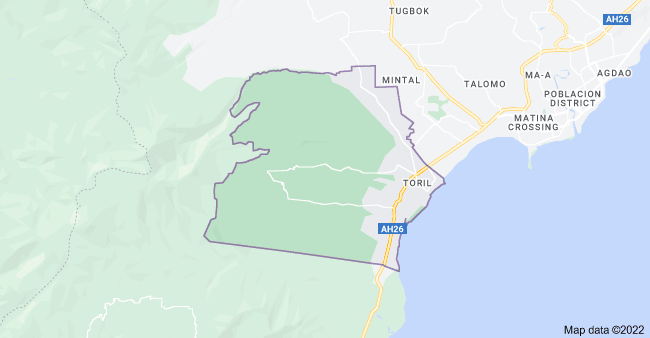 Toril District in Davao City. Map courtesy of Google
Toril District in Davao City. Map courtesy of Google
DAVAO CITY (MindaNews / 18 July) — The number of diarrhea cases that hit Toril District had reached at least 43 as of July 17 and can be now considered an outbreak, Dr. Ashley Lopez, chief of the City Health Office (CHO) said.
In an interview over Davao City Disaster Radio, Lopez said the illness hit 12 barangays in Toril — Bato, Toril Proper, Crossing Bayabas, Lubogan, Mulig, Daliao Plantation, and Tungkalan for Toril A, and Daliao North, Daliao South, Lizada Fish Port, Lizada Kurbada, and Barangay Binugaw for Toril B.
The patients were admitted to St. John Hospital, Davao Mediquest Hospital, Ernesto Guadalupe Community Hospital, and Malta Medical Center, he said.
But Lopez said that despite the number of cases the situation is now under control.
The World Health Organization defines an outbreak as the occurrence of a disease where the number of cases exceeds normal expectancy.
For the past two weeks, a post had been circulating on Facebook warning the residents of Matina and Toril area to avoid drinking tap water after patients with loose stools were admitted to hospital.
The first patient was admitted on July 15 to St. John Hospital.
The city government assured citizens in a Facebook post on July 17 that the CHO is closely coordinating with the Davao City Water District (DCWD) to address the reports of diarrhea cases in Toril.
The DCWD also posted a statement on Facebook on July 17 assuring customers that
upon receiving reports on the diarrhea cases they double-checked all their water sources in the affected area and found them safe.
“DCWD is now conducting extensive water sampling and testing in its water distribution network serving the affected areas,” the post added.
The city government established an incident command post at the District Health Center across Magsaysay Elementary School to attend to the needs of residents experiencing symptoms of diarrhea.
The city government advised those experiencing symptoms to contact 09302702823,
The head to the said incident command post. or the nearest District Health Center.
While the cause of the diarrhea outbreak was still being determined residents of the affected areas were advised to avoid using tap water for drinking and food preparation without boiling it up to 100 degrees and to let it sit for 10 minutes more after boiling to make sure that it is sterilized.
They were also advised to use purified or bottled water, if possible, and to frequently wash hands thoroughly with soap and water. (Veda Sachi C. Daliling/UP Mindanao intern)
